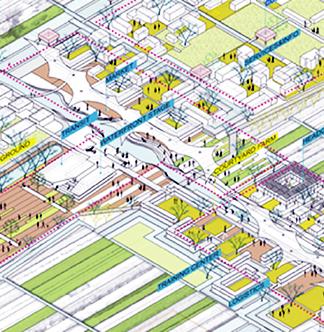event
Resilient Urban Systems: Eco City 2.0, Chongming, Shanghai
Primary tabs
Cities as systems -- of energy, materials, water, organism and informational flows -- are emerging as a fundamental research area for those working towards a sustainable and resilient urban future.
Cities are also seen as a form of metabolism, an analogy of organism that contains flows that are organized in complex forms over uncertain and stochastic processes. This perspective gives rise to questions central to sustainable urban design: What are the urban design strategies for cities to be more efficient in performance, more renewable in resource management, and more resilient in their systems behavior? What constitutes a new form of future cities that is ecologically and energy resilient to the changes needed for the post-oil urban era to come, and more importantly, how do we design for it?
The exhibition RESILIENT URBAN SYSTEMS represents an attempt of this intellectual agenda that is connected to the Sino-U.S. Eco Urban Lab, an international initiative jointly developed by Georgia Institute of Technology and Tongji University. It is composed of four sessions: Studio, Research, Design and Image:
The studio of International Urban Design in 2015 focuses on the design of urban metabolism, a sustainable future urban system using Shanghai’s Chongming Eco Island as a demonstration test bed. Three teams from the two universities are involved, including Tongji’s College of Architecture and Urban Planning, Tongji’s School of Economics and Management and Georgia Tech’s College of Architecture.
The research highlights the recent works and publications of the Sino-U.S. Eco Urban Lab. A method of urban design computational modeling is tested, which by connecting modeling techniques and urban design. It investigates “flows in cities”, how ecology functions in contemporary urban systems including exchanges of energy, materials, water flows and human movement in cities, as well as how informational systems manage the process from data, performance-based analysis to design decision.
The design showcases a ten-year work of Eco Systems Design Studio (ESD), an urban design practice founded by Perry Yang from 2005-2014 that pursue the proposition that moves from “landscape as flows” to “cities as flows”, how the future urban form emerges from the operation of ecological and energy flows -- Landscape and city can be seen as an inherently flow-driven organization, and urban design should address physical, performative, and design dimensions of flows in cities and cities as flows, and looks at how urban design as an ecological intervention would play a role in shaping future sustainable urban forms by ensuring cities’ high performance and systems resiliency.
The image session displays recent works of the photographer Phillip Jones through his snapshots of Shanghai and China by imaging everyday and transforming urban scenes of the emerging urban phenomena. Jones’ powerful, and sometimes strikingly poetic perspectives provide reflections on contemporary meanings of urbanism in the context of China’s rapid growth and de-industrialization.
For more information about the Stubbins Gallery and upcoming exhibitions, please visit the College of Architecture's website.
Status
- Workflow Status:Published
- Created By:Jessie Brandon
- Created:08/20/2015
- Modified By:Fletcher Moore
- Modified:04/13/2017
Categories
Target Audience

